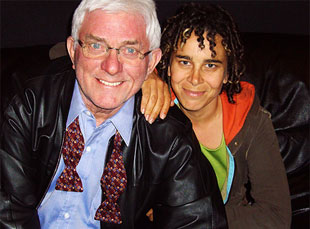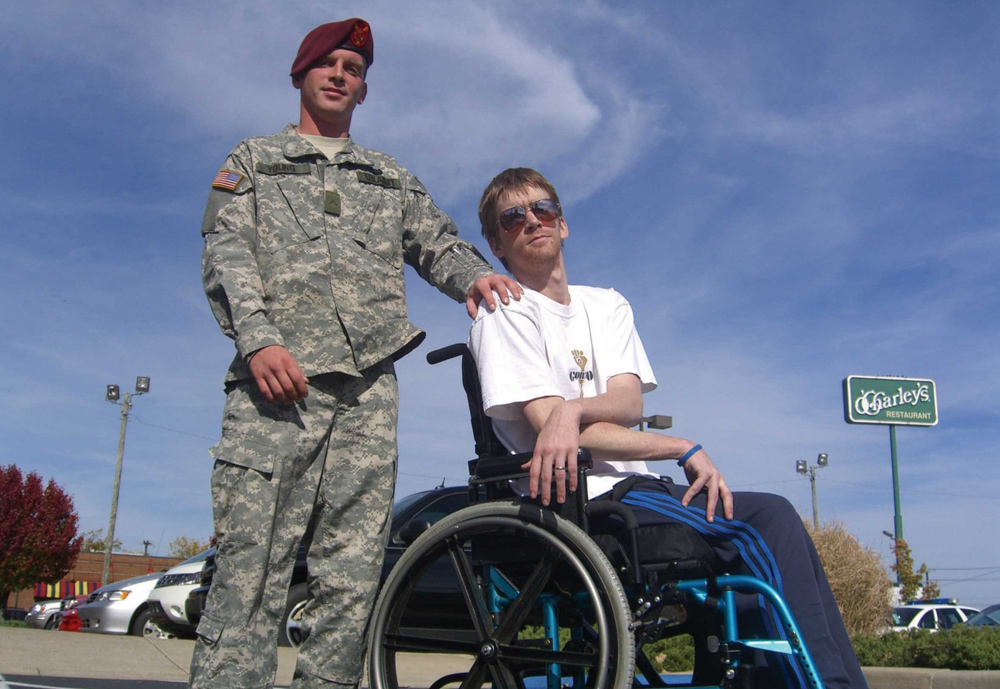To honor the late, great Phil Donahue, who passed away at age 88 this past weekend, we are republishing this interview originally conducted for IFC.com on March 24, 2008.
“My gold standard for the length of the movie was 85 minutes, which, by the way, is the length of ‘March of the Penguins’…and I missed it by two,” muses Phil Donahue, a day before his first film, “Body of War” starts its national theatrical run. “But we have longer credits, I think.”
Donahue can’t be faulted for thinking big. After a career spent in the homes of millions of Americans on his groundbreaking talk show, he’s hoping that just as many will see his first documentary, “Body of War,” in theaters — and not because of the box office. It’s the former television host’s first time working in the medium, his first time working with a partner (in co-director and Austin-based documentarian Ellen Spiro), and his first time on the road raising awareness for the film. But it’s all been worth it to Donahue, who was compelled to find a way to tell the story of Tomas Young, a young man who enlisted in the military shortly after 9/11 and came home from Iraq paralyzed. Instead of letting his disability ground him, Young becames an anti-war activist, but as Donahue and Spiro will tell you, this isn’t just another anti-Iraq war doc — “Body of War” is an examination of courage, from the average American citizen to within the highest levels of government. While in Austin for SXSW, Donahue and Spiro spoke about the response to the film, getting Eddie Vedder on board to write a song, and how Michael Moore ruined the ending of their movie.

Phil Donahue: It’s been a rush, as you can imagine. This is an odyssey that all of us have embarked on. We had no idea where this film was going to go. I knew that, when I met [Tomas] at Walter Reed, I didn’t want to just pat him on the head and say goodbye. I just got very, very lucky with this ridiculous idea that I would make a movie. I got lucky in the choice of Ellen Spiro — she’s been fabulous. I got lucky with Eddie Vedder. Eddie jumped out of the cake — “Phil!” “Eddie!” “Eddie, I’m doing an anti-Iraq war documentary.” He says, “You want a song?” And I just…”Are you kidding?” And [Tomas’s] family was good luck for us. It’s a heartland family split in the middle: red and blue [Tomas’s parents are of different political persuasions]. The reception that we’ve been getting has been very encouraging.
Ellen Spiro: You never really know what it is until you share it with an audience, so we never tire of that. I guess we never tire of it because the response has been good. [laughs] We’re dealing with this stigma of people thinking they know our story before they see it because there have been so many Iraq docs. They don’t get how different it is and that it’s really a human story that happens to be an Iraq story too. It’s a great feeling to see people be very genuinely moved and touched and want then to do something. That’s the experience I had meeting Tomas.
Phil Donahue: I took the film to Bob Graham of Florida, two-term governor, three-term senator, recently retired. He’s a “no” voter [against the war resolution] in our film. And he turned around after it was over and said, “This film should be seen by every college and university in this country.” That’s when we said, maybe we’ve got a chance here.
We’re all intimidated by the fabulous work that’s out there. In a lot of ways, I feel a little green watching some of these films — they’re so well done, well cut, compelling. We’re not saying we’re better, we’re saying we’re different. Nothing in our film goes boom. There’s no archival [footage], no moderator. It’s a story. I had said to [Ellen], “Show the pain. Let’s not sanitize this war.” What you see in our film is a drama that’s happening in thousands of homes in this country, and nobody sees it. This administration thought they were going to have a merry little war. And we now have thousands [wounded] — almost 30,000 people — many of them with hideous injuries.
Rage is the obvious emotion when seeing someone come home in the condition that Tomas did, but that doesn’t always translate into an effective film. How did you not let the rage take over?
Phil Donahue: First of all, we had a responsibility to the family to tell their truth. Their truth, not ours. And we’re very pleased that we did. There’s no pretense in our film. No hotdogging. It is what it is and you see it. And Ellen and I, co-directors? Can you imagine me a co-director? All my life, I’ve worked alone. But a lot of the disagreements that we had, the creative collisions that we had, resulted in a better film. I knew even before I embarked on this that one person can’t make a film. You need the collaborative creative process and we exploited that notion to the fullest because Ellen was firm and I was firm. All the 29 years I was on the air, I was surrounded by producers who often disagreed with me and talked back, and that was always fine with me. Because I knew their motive was a better program and the same thing [was true] here.
Ellen Spiro: [Phil] was very involved in all aspects of it. He watched every second of footage I shot, which was really scary to me at first. [laughs] It’s like somebody going through your underwear drawer or something — “Wait! Nobody watches all the raw footage. Especially not Phil Donahue. The assistant editor does that!” But he was entirely hands-on and committed to the process. He spent more time in the editing room than I did. And I would go off to Kansas City alone, usually, and try to capture the real intimacies of Tomas’s story because I knew that the film had to be different to stand out, but I also knew that in order to reach people, you have to get intimate, so that’s what we did.
Phil Donahue: It isn’t preachy. It isn’t a rant. I showed the film to Sy Hersh and he said, “This film makes me angry.” And I said, “Well, you flatter us. We hope it does the same to other people.”
Ellen, in the Q & A that followed the film’s premiere here at SXSW, Tomas had mentioned you were hesitant to “jump on the anti-war documentary bandwagon.” What was it about Tomas’ story that you found so compelling?
Ellen Spiro: I was so transfixed by Tomas that for a while, I just wanted the focus to be on Tomas’ story and not to bring in the congressional debate. I changed my mind on that when we found a creative solution for how to blend the two elements because Tomas was a big fan of Robert Byrd. He was the main spokesperson against the war. He was the main guy in this footage of the congressional debate. So when we found a way for Tomas to actually meet Robert Byrd and Robert Byrd came off of the TV footage of CSPAN and into our story, that’s when we all kind of united behind these elements in the film and that’s where I realized well, it’s going to be a better film for this.
How did Sen. Byrd get involved in the project?
Phil Donahue: I asked him. I saw what he was doing. [In the film, Byrd screams on the Senate floor] “The life of your son may depend upon it.” I couldn’t believe what I was seeing. This guy is begging his colleagues, begging, [to admit] this is not constitutional. So I was on the phone with that office for a long time. I had a hard time getting in. Finally, I got in and I showed him some of the choruses of the congressional stuff we had cut. I said, “I want you to meet Tomas.” My idea was to film Tomas and Senator Byrd going across the floor of the atrium of the National Archive building in Washington in which chamber is located the real Constitution, the actual, original document. And the next morning, it was canceled because of the Michael Moore effect. If you’re the GS controlling the government facility and you permit the filming of a scene that winds up in a movie that embarrasses the administration, you may be looking for work. People were burned in Washington by “Fahrenheit 9/11,” and Michael Moore, to his credit, I think certainly has been the single most hated person in the White House. Not only did he do this film that embarrassed the administration, but people went to see it. So the legacy of Michael Moore lives in Washington and I was burned by it. [Ultimately, the end of the film takes place in Sen. Byrd’s office.]
Even before the national release of the film, do you get a sense of where the country is from being on tour?
Phil Donahue: We’re popular now. We’re in the majority. The protesters have to get used to this. The majority of people in America now see this [war] as a mistake. I think a drawdown can happen in six months. We’re not sure what will happen if we leave, but we do know what will happen if we stay. More Americans will be killed and our movie features a mother and a son who believe that another death in Iraq is morally indefensible. What’s it going to take to rattle us here? It takes six minutes to get into a war and 60 years to get out. The aircraft carrier stunt gave them away.
“Body of War” is available to rent or buy on AppleTV.




